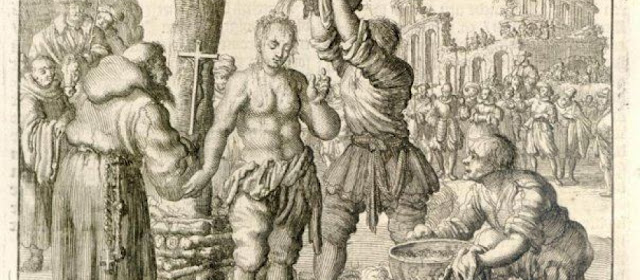Pomponio Algerio and His Resolute Faith
By Simonetta Carr - Posted at Place for Truth:
Most tourists to Rome stop by Gian Lorenzo Bernini's Fountain of the Four Rivers, in Piazza Navona. Some drop a coin in the water and make a wish. Hardly anyone is aware that in the same square a young Italian man was boiled in a cauldron of oil, pitch, and turpentine for his religious convictions. And yet, the man’s young age, stubborn refusal to recant, and astonishing composure during that final, agonizing ordeal, have contributed to imprint his name in the history of the Protestant Reformation.Algerio was born around 1531 in Nola, near Naples, Italy - the same birth-place of another famous dissenter, Giordano Bruno. That general area was also where a Spanish Reformer, Juan De Valdes, held a Protestant-leaning conventicle. Quite possibly, Algerio had already been exposed to dissenting ideas by the time he moved to the university of Padova (or Padua, as it is known outside of Italy).
In Padova, he lived with other students and professionals (including a physician and a jurist and his wife) near Porta Portello, the main city gate. More than simple room-mates, these people shared a desire to read new publications and join recent discussions.
It was not unusual. The University of Padova was known for its free exchange of ideas (which might have been a reason why Algerio moved there). The Italian Reformers Pier Paolo Vergerio and Peter Martyr Vermigli were famous alumni.
All this changed in 1555 with the election (by a slight margin) of Gian Pietro Carafa as pope, with the name of Paul IV. The mastermind behind the 1542 re-institution of the Italian Court of Inquisition, Carafa was determined to stamp out any ember of dissent. He was quoted as saying, "If our own father were a heretic, we would gather the wood to burn him.”[1]
Little is known about Algerio and his life. He is simply described as a young man with a short blond beard. From a court deposition, it appears that he was married. He was arrested in his home on May 9, 1555 and sent to the prison called “Le Debite” (“the dues” – originally meant for those who could not pay their debts), near the university.




